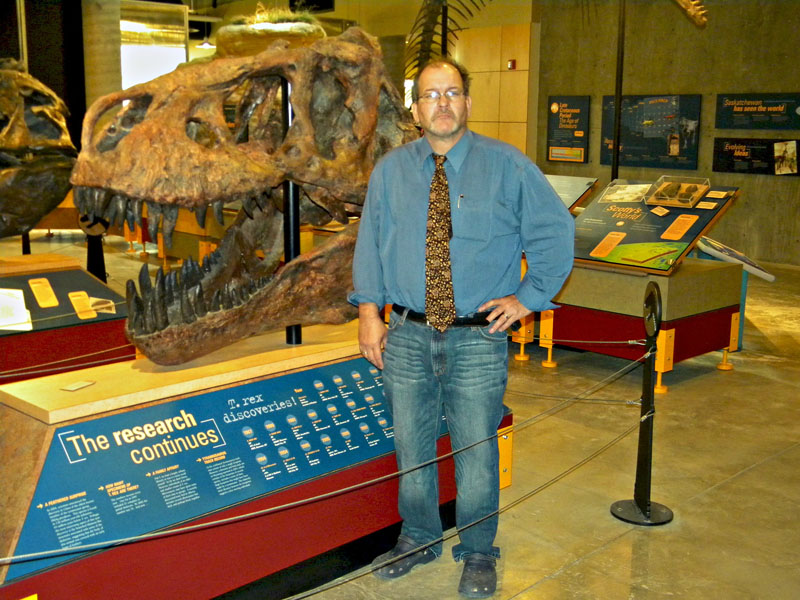
Tim Tokaryk with his most impressive find: Scotty, the most complete Tyrannosaurus Rex skeleton in Canada. Photo courtesy of Royal Saskatchewan Museum.
by Sarah Ferguson
Paleontology professor Maria Velez is concerned that the subject of paleontology at the University of Regina will soon be extinct.
Paleontology, a branch of geology that focuses on the study of prehistoric life, is a popular subject in mainstream culture. But despite this popularity, the role of paleontology in academic environments has lessened over the years, and the University of Regina is no exception ,said Velez.
“There has been a decline in the teaching of paleontology which is a shame because it is a core skill that all geologists need to do their jobs,” Velez said.
“Jobs in paleontology are not as common now; there was a time when oil companies were hiring lots of paleontologists and, these days, the field has definitely changed, but (paleontology) is a very important science, and one that needs to be taught in the academic environment,” she said.
Velez is known for her work in the field of geology, and teaches several classes about the subject matter, but she remains especially passionate about the subject of paleontology. She feels that the province of Saskatchewan, with its history of fossil discovery, remains an ideal place for the discipline to thrive, and says that the geology department should expand its class offerings in the subject.
Currently, there is only one paleontology class offered through the university. The class specializes in smaller invertebrate life forms, and Velez teaches it. “If I had my way, we would offer more (paleontology) classes but, these days, the only way to keep paleontology in universities is through an interdisciplinary approach, where classes can be counted as credits across different degrees,” she says.
Velez says that more than ever, today’s academic environment is leaning toward team teaching and interdisciplinary approaches to subjects, particularly in the field of science. “The sciences are interrelated, so the (interdisciplinary) approach it makes sense,” she said.
To promote the concept of interdisciplinary teaching, Velez recently invited Tim Tokaryk, head of the paleontology program at the Royal Saskatchewan Museum to her class last Friday to talk about vertebrate paleontology— the subject of dinosaurs.
Tokaryk, who teaches geology and biology, is internationally known for his contributions to the field. He is famous for overseeing two impressive Tyrannosaurus Rex finds, including “Scotty,” Canada’s only complete Tyrannosaurus Rex skeleton, found in Eastend, Sask. in 1991.
This September, Tokaryk gained international acclaim when he published a recent article on the mass extinction of birds. The article states that birds re-evolved after becoming extinct alongside the dinosaurs.
Saskatchewan has one of the richest deposits of fossils in the world. Tokaryk said that the province’s fossil deposits are a source of continuous knowledge, and that paleontology should be promoted in science faculties, because of the diversity it promotes in the job market.
“Students who study vertebrate paleontology are capable of teaching evolutionary theory, which is essential for biology and geology, but they can also become medical students or grade school teachers,” he said.
But there is hope. Last year, the university’s biology department allowed one fourth year student to pursue her thesis project in the subject of paleontology, said Mark Brigham, head of biology at the university. The student, Emily Boultier, worked on describing a Mosasaurus specimen that measured almost eight metres long. Boultier was working on a project and unavailable for comment at the time of this article.
“It is our hope that we will be able to expand the study of paleontology here in Regina,” said Velez. “We would like to offer more classes to our students in the future.”

